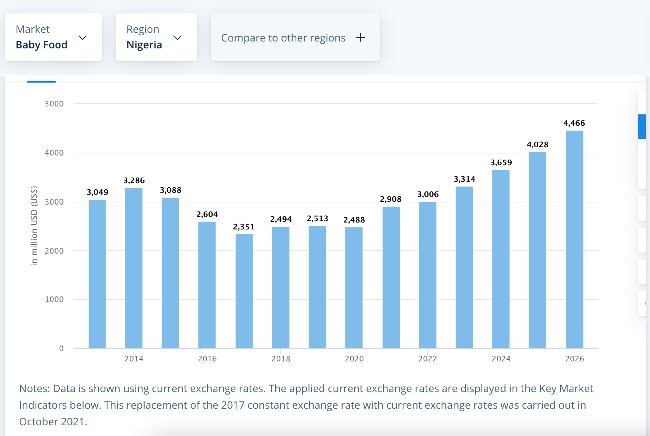News
Nigerian baby food market set to hit N1trn as women register more babies

Despite economic challenges hitting many households, the future of Nigeria’s baby food market has been reported to be a very promising one.
The positive indicators are coming amid the continuously rising birth rate and low use of contraceptives among women.
Ripples Nigeria had earlier reported that in three years a total number of 18.6 million babies were registered across the country despite six states not captured in the report.
The report data which was obtained from the National Bureau of Statistics (NBS) and National Population Commission confirmed a trend that was in consonance with a similar report from the United Nations that Nigeria is projected to increase by 90 percent to 401 million by 2050.
The United Nations Children’s Emergency Fund (UNICEF) also noted that at least seven million babies are born in Nigeria yearly.
Food is essential for babies in order to help them develop properly, hence regardless of the economic challenges, the rising population translates into a profitable market and increased sales for makers of baby food within and outside Nigeria.
A data report from Statista shows that revenue from babies foods for players in the industry amounts to $3 billion (1.24 trillion) in 2022.
It also noted that the market is expected to grow annually by 10.40% (CAGR 2022-2026).
Also, a study conducted by the Ken Research on the Nigeria Baby Food Market Outlook shows N200 billion worth market for any investor on the back of high birth rate and fertility rate.
READ ALSO: Inflation rate hits 15.63%, as food prices eat into Nigerians household income
“The future of Nigeria baby food market looks quite promising given the positive growth and development indicators, the market is expected to register a positive CAGR of 11.6 percent in terms of the revenue generated during the review period 2018-2023,” according to the outlook.
It added that newer baby food products such as specialized baby food for infants with allergies, colic, premature babies, regurgitation and other such issues might be launched in near future.
Consumer goods players are leveraging on this and introducing more products to satisfy the children market.
To clearly understand the trend, Ripples Nigeria’s analysis of Nestle Nigeria, the largest listed fast-moving consumer goods company on the Nigeria exchange and one of the biggest producers of baby food shows a massive revenue from its food products.
Some of its baby food products include Cerelac, SMA, NAN, Lactogen, and Golden Morn.
Other beverage products designed to cater to the needs of children are Milo, Milo Energy Cube, Nescafe, Milo Ready-to-drink (RTD), and Nestlé Pure Life (some of these are also taken by adults).
Between 2015 and 2020, the contribution of the company’s food products to its revenue hovered between 59.7 percent and 63 percent.
In 2015, income from food contributed N90 billion (59.7%) out of total revenue of N151 billion, and in 2016 it contributed N113 billion (62.3%) to the N181 billion realized during the period.
In 2017 and 2018, the food segment retained its position as a major contributor with 63 percent, after making N154 billion and N168 billion, respectively, out of the N244 billion and N266 billion realized during this period.
In 2019, the segment contributed N176 billion (62%) out of N284 billion revenue achieved. In 2020, it contributed N171 billion (59.81%) to the total revenue of N287 billion.
Also in the first nine months of 2021, the company reported N154.33 billion in revenue from its food segment.
Join the conversation
Support Ripples Nigeria, hold up solutions journalism
Balanced, fearless journalism driven by data comes at huge financial costs.
As a media platform, we hold leadership accountable and will not trade the right to press freedom and free speech for a piece of cake.
If you like what we do, and are ready to uphold solutions journalism, kindly donate to the Ripples Nigeria cause.
Your support would help to ensure that citizens and institutions continue to have free access to credible and reliable information for societal development.
























